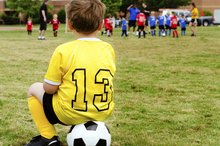More Articles
- Physical, Social, Emotional & Intellectual Benefits of Outdoor Recreation
- Physical, Social, Emotional & Intellectual Benefits of Outdoor Recreation
- Why is Regular Exercise Important For Children?
- Environmental, Cultural and Social Factors That Influence Motor-Skill Development in Children
- 10 Reasons Kids Need Fresh Air
What does fact checked mean?
At Healthfully, we strive to deliver objective content that is accurate and up-to-date. Our team periodically reviews articles in order to ensure content quality. The sources cited below consist of evidence from peer-reviewed journals, prominent medical organizations, academic associations, and government data.
- The American Journal of Public Health: A Potential Natural Treatment for Attention-Deficit/Hyperactivity Disorder
- The American Journal of Public Health: A Potential Natural Treatment for Attention-Deficit/Hyperactivity Disorder
The information contained on this site is for informational purposes only, and should not be used as a substitute for the advice of a professional health care provider. Please check with the appropriate physician regarding health questions and concerns. Although we strive to deliver accurate and up-to-date information, no guarantee to that effect is made.
The Negative Effects of Youth Staying Indoors
In the last few decades, many childhood activities have moved indoors. With increases in technology and indoor entertainment options, children are spending vast amounts of time inside -- and missing out on vital outdoor activity. According to the National Wildlife Federation, American children in 2012 had on average only four to seven minutes of unstructured outdoor play per day 1. All this time spent indoors is having a negative effect on youth that can be detrimental to not only the body, but also the mind.
Obesity
The prevalence of overweight children aged 6 to 11 more than doubled in just 24 years, going from 7 percent in 1980 to 18.8 percent in 2004, notes the NWF. Part of this huge increase is contributed to less outdoor play in youth. Dr. Kenneth Ginsburg with the American Academy of Pediatrics is a strong proponent of helping reduce obesity in youth through outdoor play. He believes that outdoor play is the perfect solution to obesity in children because it allows children the ability to have self-directed physical activity. Outdoor play is physically stimulating while increasing a child's awareness to his surroundings.
- The prevalence of overweight children aged 6 to 11 more than doubled in just 24 years, going from 7 percent in 1980 to 18.8 percent in 2004, notes the NWF.
- He believes that outdoor play is the perfect solution to obesity in children because it allows children the ability to have self-directed physical activity.
Other Physical Health Issues
Physical, Social, Emotional & Intellectual Benefits of Outdoor Recreation
Learn More
Vitamin D increases with outdoor exposure to the sun. The American Academy of Pediatrics recommends just 10 minutes of sun exposure per day for a good daily vitamin D dose. Vitamin D helps protect youth from heart disease, diabetes and bone problems. Furthermore, being outdoors may also help children with their vision, as kids who spend more time outside during the day tend to have better distance vision than those who favor indoor activities.
- Vitamin D increases with outdoor exposure to the sun.
Mental Health Issues
Spending time outdoors has been linked with lower stress levels in children. The NWF states that a child's stress levels will fall within minutes of seeing green spaces, and that the temperament of a child who spends time outdoors is also more mild than those who spend more time indoors. Therefore, outdoor play can help increase a child's ability to socially interact as well as reduce overall stress. Critical thinking skills and standardized test results are often higher in children who spend time outdoors. ADHD symptoms may also improve with more time spent outdoors, suggests a study published in the September 2004 issue of "The American Journal of Public Health."
- Spending time outdoors has been linked with lower stress levels in children.
- The NWF states that a child's stress levels will fall within minutes of seeing green spaces, and that the temperament of a child who spends time outdoors is also more mild than those who spend more time indoors.
Skills for the Future
Physical, Social, Emotional & Intellectual Benefits of Outdoor Recreation
Learn More
When youth are allowed to create and explore in the world around them -- instead of limiting themselves to indoor activities -- they can develop more competencies that lead to enhanced confidence and the ability to meet future challenges. Undirected outdoor free play allows children to work through problems individually as well as in groups. They can share, negotiate, resolve conflicts and learn self-advocacy skills. All these skills help a child not only in the present, but build a good foundation for future endeavors.
- When youth are allowed to create and explore in the world around them -- instead of limiting themselves to indoor activities -- they can develop more competencies that lead to enhanced confidence and the ability to meet future challenges.
- All these skills help a child not only in the present, but build a good foundation for future endeavors.
Related Articles
References
Writer Bio
Tara West graduated from the University of Tulsa with a bachelor's degree in business administration and human resources. West specializes in parenting, green living and career development as a regular contributor at SocialMoms.com. She has been featured on a variety of websites including a childhood favorite, Reading Rainbow.








